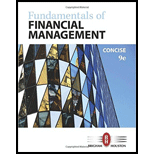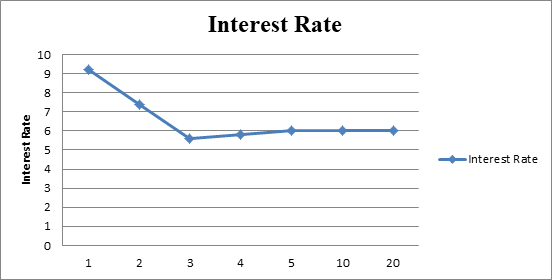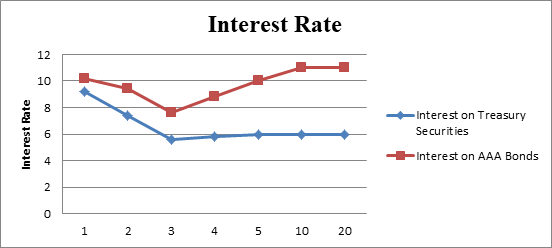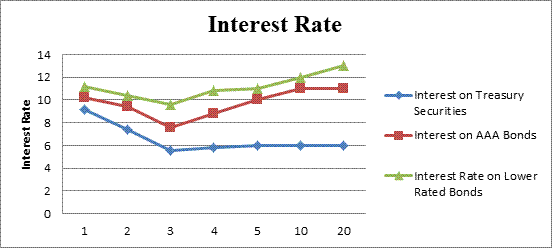
Concept explainers
a.
To identify: The interest on Treasury securities, and yield curve.
Yield:
Yield is the percentage of securities at which the return is provided by the company to its investors. Yield can be there in the form of dividend and interest.
Yield Curve:
The graphical representation of the expected return, provided by the company to its investors during the years is known as the yield curve.
a.
Answer to Problem 18P
The items required for the calculation of interest rate are the real risk-free rate, inflation rate, and maturity risk premium.
Explanation of Solution
Given,
The risk free rate is 2% or 0.02.
Inflation rate for the first year is 7% or 0.07.
The inflation rate of second year is 5% or 0.05.
The inflation rate after two years is 3% or 0.03.
The maturity risk premium for the first year is 0.2% or 0.002 and it will increase by 0.2% every year till 1%.
Formula to calculate the interest rate,
Where,
- r is the corporate bond yield.
- r* is the risk free rate.
- IP is the inflation premium.
- MRP is the maturity risk premium.
Statement to show the calculation of interest rate
| Maturity |
Real Risk-Free Rate (%) (r*) |
Inflation Rate (%) (IP) |
Maturity Risk Premium (MRP) |
Interest Rate on Treasury Bond
|
| 1 | 2 | 7 | 0.2 | 9.20 |
| 2 | 2 | 5 | 0.4 | 7.40 |
| 3 | 2 | 3 | 0.6 | 5.60 |
| 4 | 2 | 3 | 0.8 | 5.80 |
| 5 | 2 | 3 | 1 | 6 |
| 10 | 2 | 3 | 1 | 6 |
| 20 | 2 | 3 | 1 | 6 |
Table (1)
The yield curve of the given data

Fig 1
- The x-axis represents the maturity.
- The y-axis represents the interest rate.
- The interest rates with their respective time period can be shown from the graph.
Hence, the interest of 1-year treasury securities is 9.20%, at 2-year treasury securities is 7.60%, 3-year treasury securities is 5.60%, 4-year treasury securities is 5.80% and thereafter is 6%.
b.
To identify: The interest rate on AAA rated securities, and the yield curve.
b.
Answer to Problem 18P
The items required for the calculation of interest rate are real risk-free rate, inflation rate, and maturity risk premium.
Explanation of Solution
Explanation:
Given,
The risk free rate is 2% or 0.02.
Inflation rate for the first year is 7% or 0.07.
The inflation rate of second year is 5% or 0.05.
The inflation rate after two years is 3% or 0.03.
The maturity risk premium for the first year is 0.2% or 0.002 and it will increase by 0.2% every year till 1%.
The default risk premium is 1% which increases
Formula to calculate the interest rate,
Where,
- r is the corporate bond yield.
- r* is the risk free rate.
- IP is the inflation premium.
- MRP is the maturity risk premium.
- DRP is the default risk premium.
Statement to show the calculation of interest rate
| Maturity |
Real Risk-Free Rate (%) (r*) |
Inflation Rate on Treasury Bond (%) (IP) |
Maturity Risk Premium (%) (MRP) |
Interest Rate on Treasury Bond
|
Default Risk Premium (%) (DRP) |
Interest Rate on AAA rated Bonds
|
| 1 | 2 | 7 | 0.2 | 9.20 | 1 | 10.20 |
| 2 | 2 | 5 | 0.4 | 7.40 | 2 | 9.40 |
| 3 | 2 | 3 | 0.6 | 5.60 | 2 | 7.60 |
| 4 | 2 | 3 | 0.8 | 5.80 | 3 | 8.80 |
| 5 | 2 | 3 | 1 | 6 | 4 | 10 |
| 10 | 2 | 3 | 1 | 6 | 5 | 11 |
| 20 | 2 | 3 | 1 | 6 | 5 | 11 |
Table (2)
The yield curve of the given data

Fig 2
- The x-axis represents the maturity.
- The y-axis represents the interest rate.
- The interest rates of treasury securities and AAA bonds with their respective time period can be shown from the graph.
Hence, the interest of 1-year AAA bond is 10.20%, at 2-year AAA bond is 9.40%, 3-year AAA bond is 7.60%, 4-year AAA bond is 8.80% 5-year AAA bond is 10% and thereafter it is 11%.
c.
To identify: The interest rate on lower rated bonds, and the yield curve.
c.
Answer to Problem 18P
The items required for the calculation of interest rate are the inflation rate, real risk-free rate, and maturity risk premium.
Explanation of Solution
Given,
The risk free rate is 2% or 0.02.
Inflation rate for the first year is 7% or 0.07.
The inflation rate of second year is 5% or 0.05.
The inflation rate after two years is 3% or 0.03.
The maturity risk premium for the first year is 0.2% or 0.002 and it will increase by 0.2% every year till 1%.
The default risk premium is 1% which increases
Formula to calculate the interest rate,
Where,
- r is the corporate bond yield.
- r* is the risk free rate.
- IP is the inflation premium.
- MRP is the maturity risk premium.
- DRP is the default risk premium.
Statement to show the calculation of interest rate on AAA rated bonds
| Maturity |
Real Risk-Free Rate (%) (r*) |
Inflation Rate on Treasury Bond (%) (IP) |
Maturity Risk Premium (%) (MRP) |
Default Risk Premium (%) (DRP) |
Interest Rate
|
| 1 | 2 | 7 | 0.2 | 1 | 10.20 |
| 2 | 2 | 5 | 0.4 | 2 | 9.40 |
| 3 | 2 | 3 | 0.6 | 2 | 7.60 |
| 4 | 2 | 3 | 0.8 | 3 | 8.80 |
| 5 | 2 | 3 | 1 | 4 | 10 |
| 10 | 2 | 3 | 1 | 5 | 11 |
| 20 | 2 | 3 | 1 | 5 | 11 |
Table (3)
Statement to show the calculation of interest rate on lower rated bonds
| Maturity |
Real Risk-Free Rate (%) (r*) |
Inflation Rate on Treasury Bond (%) (IP) |
Maturity Risk Premium (%) (MRP) |
Default Risk Premium on Lower rated Bonds (%) (DRP) |
Interest Rate (%)
|
| 1 | 2 | 7 | 0.2 | 2 | 11.2 |
| 2 | 2 | 5 | 0.4 | 3 | 10.40 |
| 3 | 2 | 3 | 0.6 | 4 | 9.60 |
| 4 | 2 | 3 | 0.8 | 5 | 10.80 |
| 5 | 2 | 3 | 1 | 5 | 11 |
| 10 | 2 | 3 | 1 | 6 | 12 |
| 20 | 2 | 3 | 1 | 7 | 13 |
Table (4)
The yield curve of the given data

Fig 2
- The x-axis represents the maturity.
- The y-axis represents the interest rate.
- The interest rates of Treasury securities, AAA bonds and lower rated bonds with their respective time period can be shown from the graph.
Hence, the interest of 1-year lower rated bond is 11.20%, at 2-year lower rated bond is 10.40%, 3-year lower rated bond is 9.60%, 4-year lower rated bond is 10.80% 5-year lower rated bond is 11%, 10-year lower rated bond is 12% and thereafter is 13%.
Want to see more full solutions like this?
Chapter 6 Solutions
LMS Integrated for MindTap Finance, 1 term (6 months) Printed Access Card for Brigham/Houston's Fundamentals of Financial Management, Concise Edition, 9th
- If data is unclear or blurr then comment i will write it. please don't use AI i will unhelpfularrow_forwardYou are considering an option to purchase or rent a single residential property. You can rent it for $5,000 per month and the owner would be responsible for maintenance, property insurance, and property taxes. Alternatively, you can purchase this property for $204,500 and finance it with an 80 percent mortgage loan at 4 percent interest that will fully amortize over a 30-year period. The loan can be prepaid at any time with no penalty. You have done research in the market area and found that (1) properties have historically appreciated at an annual rate of 2 percent per year, and rents on similar properties have also increased at 2 percent annually; (2) maintenance and insurance are currently $1,545.00 each per year and they have been increasing at a rate of 3 percent per year; (3) you are in a 24 percent marginal tax rate and plan to occupy the property as your principal residence for at least four years; (4) the capital gains exclusion would apply when you sell the property; (5)…arrow_forwardIf data is unclear or blurr then comment i will write it.arrow_forward
- I need answer typing clear urjent no chatgpt used pls i will give 5 Upvotes.arrow_forwardcorrect an If image is blurr or data is unclear then plz comment i will write values or upload a new image. i will give unhelpful if you will use incorrect data.arrow_forwardWhat are the five management assertions that serve as basis for financial statements audit programs?arrow_forward
 EBK CONTEMPORARY FINANCIAL MANAGEMENTFinanceISBN:9781337514835Author:MOYERPublisher:CENGAGE LEARNING - CONSIGNMENT
EBK CONTEMPORARY FINANCIAL MANAGEMENTFinanceISBN:9781337514835Author:MOYERPublisher:CENGAGE LEARNING - CONSIGNMENT Intermediate Financial Management (MindTap Course...FinanceISBN:9781337395083Author:Eugene F. Brigham, Phillip R. DavesPublisher:Cengage Learning
Intermediate Financial Management (MindTap Course...FinanceISBN:9781337395083Author:Eugene F. Brigham, Phillip R. DavesPublisher:Cengage Learning

